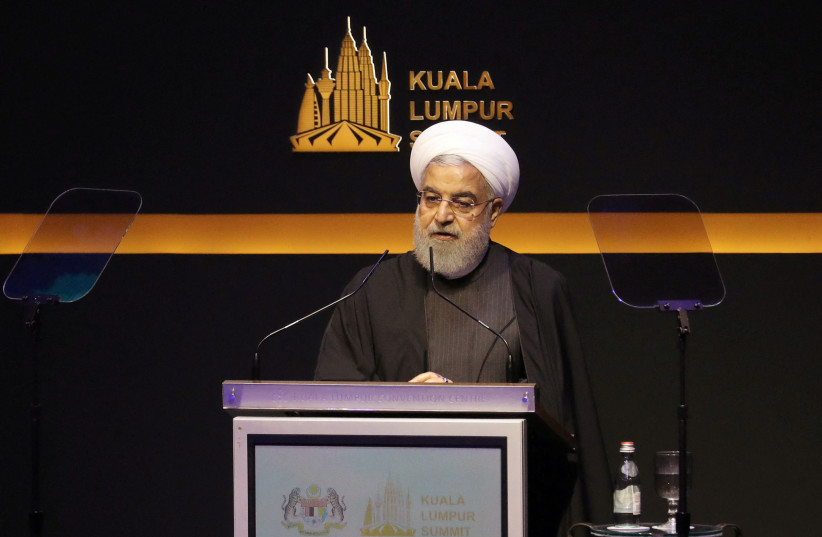Elections in Iran are slated for March 1.
Candidates will vie for 285 of the 290 seats that comprise the Islamic Consultative Assembly. The other five seats are reserved for Zoroastrians, Jews, Assyrian and Chaldean Christians, and Armenians, the minority groups within Iran.
The Assembly of Experts will be holding elections as well. It is the 88-member august body that chooses Iran’s Supreme Leader.
The results of this election will be like the results of all other elections held in Iran. A new regime, not even a democratically elected liberal regime, will turn Iran into a different country. It will not turn Iran into a Western democracy. It will not transform the Iran of today into a country that embraces the great culture of ancient Persia.

Iran after March 1st will, instead, look a lot like Iran before March 1st.
In Iran, there is a very strict set of requirements for candidates intending to stand for election. Anyone who does not fit the mold is simply not permitted to run. Hassan Rouhani, for example, who was president of Iran from 2013 to 2021, has been disqualified from running for office again. The reason is not because of term limits, but because he and his supporters are simply seen as too liberal. While he is appealing the decision, there is no chance that he will win the appeal.
He knows it. We know it. This is, after all, Iran.
When he first ran – and he ran successfully – it was as a reform candidate. He was touted by the Western world as the reformer who was going to change Iran. But that never happened.
This time around, even if a reform candidate were to win the election, we will all be more modest in our aspirations about reform in Iran. History has shown that the newly elected president will have no strength to implement either pro-western or Western-friendly policies.
This time around, we have learned our lesson from Rouhani’s experience.
When Rouhani last ran for office as president of Iran, Westerners were duped into believing that this new liberal Iranian leader would bring Iran into a new era. We believed, or wanted to believe, that he would lead Iran towards a more Western-leaning mindset. Western analysts and Western leaders fell in love with Rouhani. They loved his ideas and were swayed by his rhetoric. And Rouhani’s intentions were good; he, too, believed his rhetoric. But that type of reform cannot happen in Iran.
The president of Iran is neither the supreme lawmaker nor the senior decision-maker in Iran.
Iran is entrenched in its long-held, Ayatollah-dictated policies. Its foreign policy approach, which is anti-West, anti-United States, and anti-Israel, will continue as such, unchanged and immovable.
This time, please, do not be swayed by the ridiculous sophistry woven together by amateur Western analysts, some even in Washington, who may continue to hold on to the dream of a reformed and liberal Iran.
Iran will not change. More importantly for us, Iran’s foreign policy does not change.
Iran's raison d’être
A SIGNIFICANT SLICE of Iran’s raison d’être is to attack and destroy Israel and the West. Regardless of the upcoming election results, Iran will continue to attack Israel and the West. It will continue to use its proxies, like the Houthis, Hezbollah, and Hamas, to do the dirty work.
Iran will take great pride in making the Middle East more volatile, more dangerous, and more combustible.
It will continue in its effort, however unsuccessful, to unite Muslims around the world against Israel and the West. Iran yearns to be the central leader of the Muslim world, and Iran is convinced that Israel is a vehicle – a tool, a symbol of hate – that can unite the Muslim masses.
But Iran is at a significant disadvantage in this task. While Iranians are Muslims, they are Persian, not Arab. As such, they would never naturally become the leaders of the Muslim and Arab world. So, they are hoping to unite and galvanize Muslims in their hatred of Jews and Israel.
The other element working against Iran in its hope of becoming the leader of the Muslim world is that they are Shi’ites in a sea of Sunni Muslims.
Yet, they refuse to give up their dream of Arab and Muslim world leadership.
The links that Iran has fostered with Russia and China will continue unchanged, even under a new presidency. This alliance is significant not just because it empowers Iran to continue to bust US sanctions but also because, together, they create a nexus that holds the belief that the United States should not dictate and direct world affairs.
So, yes, elections are coming up in Iran. But it does not matter who sits in the political seats of power in Iran. Iran is not about to change.
The writer is a social and political commentator. Watch his TV show Thinking Out Loud on JBS. Read his latest book THUGS.
